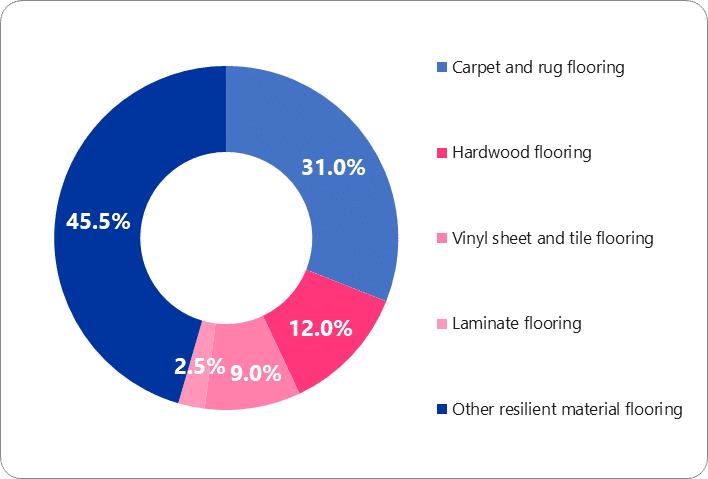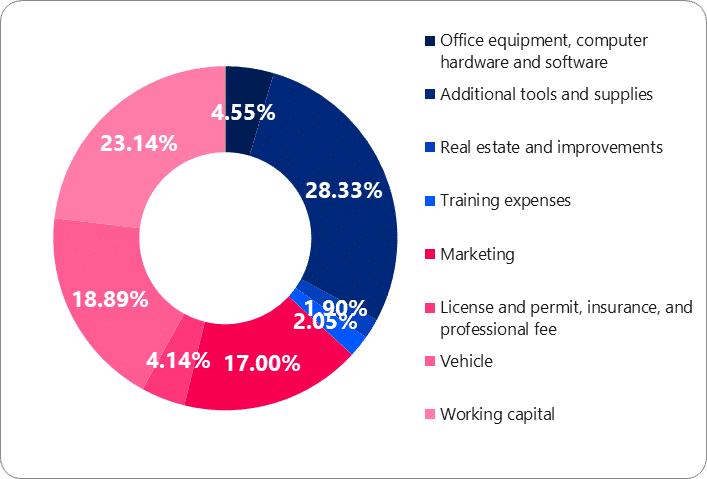With a market size of $28.5 billion in 2023 and an expected rise to $37.7 billion by 2028, the flooring industry presents a significant opportunity for entrepreneurs. This article delves into the the flooring installation business, exploring its profitability, revenue estimates, and the costs involved in starting your own.
We’ll examine the financial aspects of the industry: What is the average revenue for a flooring installation business? How does this translate into daily operations and annual income? These insights are essential for anyone considering stepping into this competitive market.
Additionally, we’ll discuss the startup costs for a flooring installation business. From tools and marketing to licensing and vehicles, we’ll provide a detailed breakdown of the initial investment needed.
Finally, we’ll analyze the operating profit margin of a flooring installation business and the recurring costs involved in maintaining the business. Let’s dive in!
Flooring installers market overview
As per IBIS, the flooring installers market in the U.S. represented revenue of $28.5 billion in 2023 and is expected to grow to $37.7 billion by 2028.
Other resilient material flooring represents the largest share ($13 billion), followed by carpet and rug flooring ($8.8 billion), hardwood flooring ($3.4 billion), vinyl sheet and tile flooring ($2.6 billion), and laminate flooring ($710 million). Yet, with over 122,000 flooring installers across the country, the competition is also fierce.

How much revenue does a flooring installer make?
Using the same source earlier, it’s safe to assume that the average turnover for flooring installation business is around $233,600. Indeed, the U.S. flooring installer industry is worth $28.5 billion and there are about 122,000 flooring installation businesses across the U.S.
Now, using data from more than 560 franchised flooring installation businesses, a flooring installer earns $563,000 in gross revenue per year on average. This number is the average gross revenue per installer and there are about 560 businesses of the largest 8 flooring installation franchises in the U.S.
With an average cost per reflooring of $3,500, that’s a total of ~160 installations per year. Assuming 250 working days per year, that’s on average one reflooring every 1-2 days.
Yet, not all flooring installers have the same yearly revenue. Logically, some will earn more than others because of many factors like project scale, efficient management, local reputation, pricing strategies, team expertise, and adaptability to market trends.
How much does it cost to start a flooring installation business?
On average, it costs between $97,000 to $161,000 to open a flooring installation business.
This includes various costs such as office equipment, computer hardware, and software; additional tools and supplies; real estate and improvements; training expenses; marketing; license, permit, insurance, and professional fees; vehicles; and working capital for the first few months of the business operations.
- Office equipment, computer hardware, and software (5%): Budget for essential office tools, computer technology, and software tailored to optimize administrative functions of the business.
- Additional tools and supplies (28%): Budget dedicated to acquiring the extra tools and supplies, such as specialized flooring materials, adhesives, precision tools, safety equipment, etc. necessary for various flooring installation projects.
- Real estate and improvements (2%): Cost for real estate rental and enhancements, optimizing the business location for efficiency.
- Training expenses (2%): Cost for ongoing training programs aimed at enhancing the skills and knowledge of the workforce in the flooring installation.
- Marketing (17%): Allocated for promotional activities, advertising, and strategic marketing efforts aimed at enhancing brand visibility and attracting clients to the business.
- License and permit, insurance, and professional fee (4%): Allocated cost covering legal compliance, insurance coverage, and professional services essential for the smooth and lawful operation of the business.
- Vehicle (19%): Significant budget dedicated to acquiring, maintaining, and operating vehicles essential for efficient transportation to and from flooring installation sites.
- Working capital (23%): Substantial cost allocated to cover day-to-day operational expenses such as employee salaries, utility bills, material purchases, and unforeseen costs for the first 3-6 months of the business.

How profitable is a flooring installation business?
A flooring installer has a ~20 % operating profit margin (EBITD8A margin) after operating costs (salaries, materials, etc.) have been incurred.
Indeed, there are various recurring costs involved in running a flooring installation business. The major expenses include cost of services followed by labor:
- Cost of services (30-60% of revenue): Expenses related to materials, labor, and project-specific costs essential for the provision of flooring installation services.
- Salaries (20-30% of revenue): Cost for compensating administrative and office staff essential for the efficient functioning of the flooring installation business.
- Other administrative expenses (5-10% of revenue): Expenses covering miscellaneous administrative costs such as office supplies, utilities, office rent, etc. for day-to-day functions.

